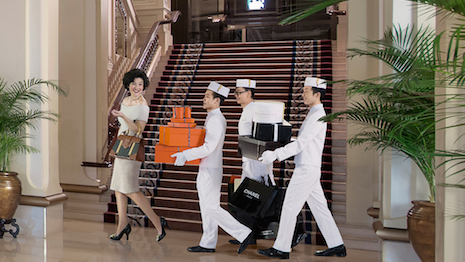- About
- Subscribe Now
- New York,
July 18, 2017

 Chinese travelers look to U.S. to shop. Image credit: Peninsula Hotels & Resorts
Chinese travelers look to U.S. to shop. Image credit: Peninsula Hotels & Resorts
The United States is becoming a highly coveted travel destination among affluent Chinese consumers, and due to their spending habits the demographic has proven extremely influential, according to a new report from YouGov.
Chinese affluent look to purchase luxury goods while traveling abroad, and Chinese consumers spend the most out of any group while traveling. YouGov's Affluent Perspective 2017: Chinese Luxury Shoppers in America finds that 56 percent of Chinese affluent are planning a trip to the U.S. within the next two years.
"China’s affluent who have visited the United States for shopping and travel for luxury shopping know they can purchase the items they desire in their home country — so why fly across the Pacific to shop?" said Cara David managing partner for affluent perspective at YouGov. "We believe that these consumers want more than fresh sneakers or a fancy blouse; they want a unique experience that elevates their relationship with the brands they love."
Chinese travelers
YouGov has determined that 51 percent of affluent Chinese travelers are looking to purchase luxury goods while away. The U.S. is listed as the fourth-most popular country for shopping during travel.
New York, Los Angeles, San Francisco, Las Vegas and Chicago are pushing this interest in shopping forward.
New York Times Square
While the Chinese affluent population is extremely important to the luxury goods sector in the U.S., these consumers need an unparalleled experience while shopping. One hundred percent of those surveyed claimed that an exceptional experience would mean they will return.
These shoppers also believe that the experience should separate luxury brands from non-luxury, with 65 claiming a high-level experience is indicative of a luxury brand.
An emotional connection to the brand is also important, as 93 percent of Chinese affluents say that a personal relationship with a retailer or brand is a factor when it comes to customer loyalty.
Marketers looking to cater to affluent travelers from China should keep in mind these visitors are primarily millennials that are cultured, educated, successful, happy and comfortable anywhere in the world.
Almost 70 percent of Chinese affluent are millennials and only 29 percent are considered Gen X. Eighty-eight percent believe they are “extremely happy,” and 82 percent feel comfortable in any country around the world.
The famed Rodeo Drive in Los Angeles' Beverly Hills area
An estimated $13,400 is spent per every Chinese traveler. During the beginning of 2016, 2.6 million Chinese consumers spent a total of $34.8 billion from January to October.
Additional insight
Retail in relation to travel is a significant source of revenue with global duty-free shopping projected to increase 27 percent by 2021, according to another report from GlobalData.
GlobalData's research found that shopping within airports hit a global spend of $38 billion last year and is on track for $49 billion by 2021. Travelers are now getting to the airport earlier to ensure passing through security on time, which is increasingly becoming more complicated, leading to more spare time to shop before flights (see more).
The rising sophistication of Chinese travelers has resulted in a retail and tourism boom in the Middle East and North Africa, as visitors seek new destinations off the beaten path.
According to another report by The Luxury Conversation, and commissioned by Reuters Communications, the Middle East and North Africa (MENA) region is no longer lagging in popularity among Chinese tourists. Most often, tourism from China is linked to Europe and North America, but increasingly, due primarily to visa policies, infrastructure and experiential trends, Chinese tourists are booking trips to MENA, opening opportunities for luxury brands and hospitality (see more).
"[Chinese affluent] want things, yes, but also the pleasure of walking the aisles and seeing the sights," Ms. David said. "They want the pure joy that comes from stumbling across something unexpected or new.
"For retailers, this means that, if done right, the flagship store can still serve as a brand beacon and provide a place for customers visiting from afar to spend their afternoon exploring," she said.
Share your thoughts. Click here